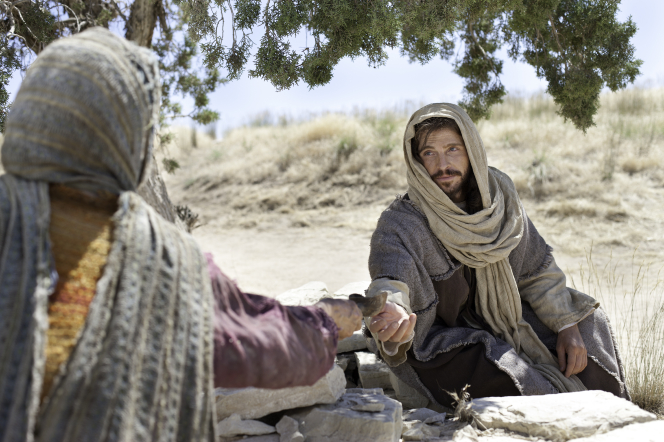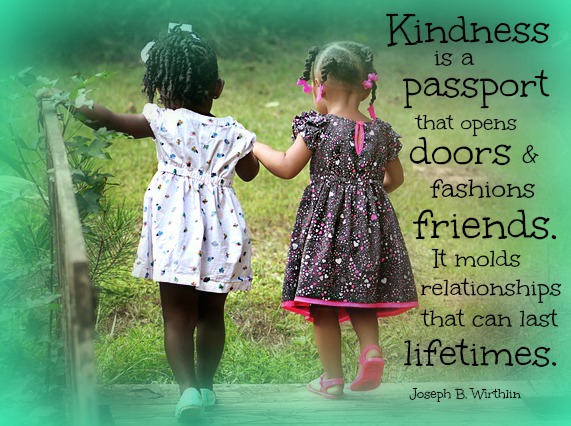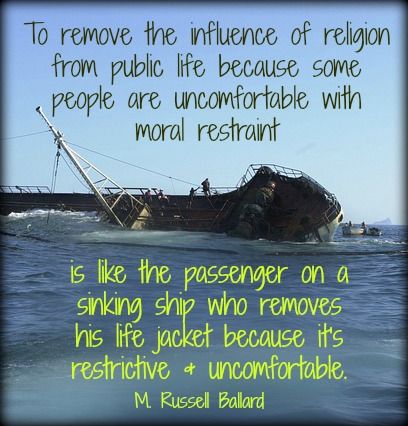I have to admit, I’m a girl who loves princess movies. As a kid I saw every Disney princess movie ever made. But I think the recent release of Disney’s live action Cinderella is one of my favorites, because it illustrates the power in kindness, courage, work and forgiveness in this fairy tale. The simplicity in these virtues often causes them to be overlooked and underappreciated in the world today. But they brought out the best in Cinderella and helped her to stay strong and true to who she was even when those around her were lost in their grief and sorrows.
These virtues aren’t just powerful in the movies—they are superpowers in the real world, too. The scriptures as well as modern prophets and Apostles of The Church of Jesus Christ of Latter-day Saints provide excellent examples of these virtues in action. But at the end of the day, do we really understand how powerful these virtues are in our own lives?
Kindness—Not Just for Cinderella
Cinderella is famous for her friendships with the mice in her house and other animals around her. She is kind to everyone, even when that kindness is not reciprocated. Cinderella’s mother, on her deathbed, told Cinderella that kindness is a power that few people truly understand. The late Elder Joseph B. Wirthlin agreed. He said:
Kindness is the essence of greatness and the fundamental characteristic of the noblest men and women I have known. Kindness is a passport that opens doors and fashions friends. It softens hearts and molds relationships that can last lifetimes.
Kind words not only lift our spirits in the moment they are given, but they can linger with us over the years. … Kindness should permeate all of our words and actions at work, at school, at church, and especially in our homes.
Jesus Christ set the example of kindness for us. Elder Wirthlin said:
Jesus, our Savior, was the epitome of kindness and compassion. He healed the sick. He spent much of His time ministering to the one or many. He spoke compassionately to the Samaritan woman who was looked down upon by many. He instructed His disciples to allow the little children to come unto Him. He was kind to all who had sinned, condemning only the sin, not the sinner.
Elder M. Russell Ballard said:
The love the Savior described is an active love. It is not manifested through large and heroic deeds but rather through simple acts of kindness and service. There are myriad ways and circumstances in which we can serve and love others.
One way that we can show kindness is in the way we speak to others. Elder Jeffrey R. Holland said:
… In this long eternal quest to be more like our Savior, may we try to be “perfect” men and women in at least this one way now—by offending not in word, or more positively put, by speaking with a new tongue, the tongue of angels. Our words, like our deeds, should be filled with faith and hope and charity, the three great Christian imperatives so desperately needed in the world today.
Another way that we show kindness is in the way we treat others. Elder Wirthlin said:
Each one of us will travel a different road during this life. Each progresses at a different rate. Temptations that trouble your brother may not challenge you at all. Strengths that you possess may seem impossible to another.
Never look down on those who are less perfect than you. Don’t be upset because someone can’t sew as well as you, can’t throw as well as you, can’t row or hoe as well as you.
We are all children of our Heavenly Father. And we are here with the same purpose: to learn to love Him with all our heart, soul, mind, and strength, and to love our neighbor as ourselves.
The Courage of a Queen
The other piece of advice that Cinderella’s mother gave her as she lay dying was to have courage no matter what. Courage is another virtue that carries a lot of power. Elder Lynn G. Robbins said:
Courage is not just one of the cardinal virtues, but as C. S. Lewis observed: “Courage is … the form of every virtue at the testing point. … Pilate was merciful till it became risky.” King Herod was sorrowful at the request to behead John the Baptist but wanted to please “them which sat with him at meat” (Matthew 14:9). … Many of the New Testament chief rulers “believed on [the Lord]; but because of the Pharisees they did not confess him, lest they should be put out of the synagogue: for they loved the praise of men more than the praise of God” (John 12:42–43). The scriptures are full of such examples.
The scriptures are also full of examples of those who showed great courage in the face of adversity, such as Queen Esther in the Old Testament. Esther was raised by her cousin Mordecai, who worked for the king, after her parents passed away. She pleased the king, and he made her his queen. (See Esther 2:17.) She never disclosed that she was Jewish, per Mordecai’s instructions. Not long afterward, Mordecai angered Haman, one of the leader’s in the king’s court, by refusing to kneel before him. In retaliation, Haman plotted to destroy not only Mordecai but all of the Jewish people.
Sister Mary Ellen Smoot, at the time the LDS General Relief Society President, said:
Realizing the grave danger which loomed over his people, Mordecai pled with Esther to seek help from the king: “For if thou altogether holdest thy peace at this time, then shall there enlargement and deliverance arise to the Jews from another place; but thou and thy father’s house shall be destroyed: and who knoweth whether thou art come to the kingdom for such a time as this?” (Esther 4:14).
Consider Esther’s dilemma: It was against the law to approach the king without being summoned. Such an act was punishable by death. If she were to remain quiet, she would likely enjoy a life of luxury and ease. She could live the life of a queen or risk her life to save her family and her people. She counted the cost and chose to heed the longings of her people and of her heart.
Esther asked Mordecai and the Jews to fast for three days, and she and her handmaids did the same. She declared:
… So will I go into unto the king, which is not according to law: and if I perish, I perish. (Esther 4:16).
President Thomas S. Monson said:
Esther had gathered her courage and would stand firm and immovable for that which was right.
Physically, emotionally, and spiritually prepared, Esther stood in the inner court of the king’s house. When the king saw her, he held out his golden scepter, telling her that he would grant whatever request she had. She invited the king to a feast she had arranged, and during the feast she revealed that she was a Jew. She also exposed Haman’s underhanded plot to exterminate all of the Jews in the kingdom. Esther’s plea to save herself and her people was granted.
Esther, through fasting, faith, and courage, had saved a nation.
Esther could truly be described as a scriptural Cinderella (minus the wicked relatives). Raised as the daughter of someone who worked for the king, she found favor with the king and was chosen to be his queen. But her greatness came not in being elevated to the status of royalty but in being willing to sacrifice her status to help save a nation—her people—from destruction. President Monson said:
The call for courage comes constantly to each of us. Every day of our lives courage is needed—not just for the momentous events but more often as we make decisions or respond to circumstances around us. Said Scottish poet and novelist Robert Louis Stevenson: “Everyday courage has few witnesses. But yours is no less noble because no drum beats for you and no crowds shout your name.”
The Magic of Work
Cinderella’s stepmother put her to work in the house, saying that it would help keep her mind off of her sorrow. Ironically, Cinderella’s stepmother was absolutely right. I have to wonder how differently Cinderella’s stepfamily would have turned out had they heeded their own advice. Bishop H. David Burton said:
Today, many have forgotten the value of work. Some falsely believe that the highest goal in life is to achieve a condition in which one no longer needs to work. President David O. McKay (1873–1970) was fond of saying, “Let us realize that the privilege to work is a gift, that power to work is a blessing, that love of work is success.”
Work is not a matter of economic need alone; it is a spiritual necessity. … To work—honestly and productively—brings contentment and a sense of self-worth.
Work is not just doing things for ourselves but also reaching out to help others. This is another example that Jesus Christ set for us. Elder James B. Martino said:
Christ was the epitome of service. His life was filled with examples of helping and serving others, and His greatest gift of all was what He did for us. … When we serve others, we forget our own problems, and by working to relieve the pain or discomfort of others, we strengthen ourselves.
Elder D. Todd Christofferson said:
God has designed this mortal existence to require nearly constant exertion. I recall the Prophet Joseph Smith’s simple statement: “By continuous labor [we] were enabled to get a comfortable maintenance” (Joseph Smith—History 1:55). By work we sustain and enrich life. It enables us to survive the disappointments and tragedies of the mortal experience. Hard-earned achievement brings a sense of self-worth. Work builds and refines character, creates beauty, and is the instrument of our service to one another and to God. A consecrated life is filled with work, sometimes repetitive, sometimes menial, sometimes unappreciated but always work that improves, orders, sustains, lifts, ministers, aspires.
Cinderella benefitted from the magic of work while her stepmother and stepsisters languished in vanity, misery and spiritual poverty. She lost herself in the work of serving others, and thus in so doing rose above her circumstances.
Forgiveness is Freeing

Through the love of the Savior, Jesus Christ, we can find the strength to forgive those who have trespassed against us.
In the end, Cinderella frankly forgave her stepmother and stepsisters of their trespasses. She didn’t want to be burdened by the weight of animosity and bitterness that beset her stepfamily. They were ravaged by resentment, disappointment, grief and pride. Unable to see beyond their own circumstances, they sought to elevate themselves by destroying Cinderella. In the end, they did just the opposite. This is true in our own lives as well. If we seek to elevate ourselves by ruining another, we will only succeed in destroying ourselves.
President Boyd K. Packer told the story of a man who lost his wife after the birth of their first child due to the negligence of the traveling country doctor. The man was grief-stricken and angry at the doctor. President Packer continued:
A grieving, heartbroken young man went to see his spiritual leader. … The counsel from this wise servant was simply: “John, leave it alone. Nothing you do about it will bring her back. Anything you do will make it worse. John, leave it alone.”
My friend told me then that this had been his trial, his Gethsemane. How could he leave it alone? Right was right! A terrible wrong had been committed, and somebody must pay for it.
However, the man finally decided to get hold of himself and follow the counsel that he had been given. President Packer said:
Then [the man] told me, “I was an old man before I finally understood. It was not until I was an old man that I could finally see a poor country doctor—overworked, underpaid, run ragged from patient to patient, with little proper medicine, no hospital, few instruments. He struggled to save lives, and succeeded for the most part.
“He had come in a moment of crisis when two lives hung in the balance and had acted without delay.
“I was an old man,” he repeated, “before finally I understood. I would have ruined my life,” he said, “and the lives of others.”
… And that is my counsel to you. If you have festering sores, a grudge, some bitterness, disappointment, or jealousy, get hold of yourself. You may not be able to control things out there with others, but you can control things here, inside of you.
In life it is easy to see things from our own points of view, but we can’t always see the whole picture. However, our Heavenly Father and His Son, Jesus Christ can. It is for this reason that the Savior said, “I, the Lord, will forgive whom I will forgive, but of you it is required to forgive all men” (Doctrine & Covenants 64:10). Elder David E. Sorenson said:
This is not to say that forgiveness is easy. When someone has hurt us or those we care about, that pain can almost be overwhelming. It can feel as if … we have no choice but to seek vengeance. But Christ, the Prince of Peace, teaches us a better way. It can be very difficult to forgive someone the harm they’ve done us, but when we do, we open ourselves up to a better future. No longer does someone else’s wrongdoing control our course. When we forgive others, it frees us to choose how we will live our own lives. Forgiveness means that problems of the past no longer dictate our destinies, and we can focus on the future with God’s love in our hearts.
This is the beauty and miracle of forgiveness. And it is found only in and through the example and Atonement of Jesus Christ. President Dieter F. Uchtdorf said:
The pure love of Christ can remove the scales of resentment and wrath from our eyes, allowing us to see others the way our Heavenly Father sees us: as flawed and imperfect mortals who have potential and worth far beyond our capacity to imagine. Because God loves us so much, we too must love and forgive each other.
Our Choices Define Who We Are
At the end of the day, our choices define who we are. Like Cinderella’s wicked stepfamily, we can choose to be miserable in our circumstances. Or we can choose to be happy, as did Cinderella. Into each life, some rain will come. But it’s how we choose to deal with the rain and mud that defines our character. Elder L. Tom Perry said:
Those of us who have been around a while … have recognized certain patterns in life’s test. There are cycles of good and bad times, ups and downs, periods of joy and sadness, and times of plenty as well as scarcity. When our lives turn in an unanticipated and undesirable direction, sometimes we experience stress and anxiety. One of the challenges of this mortal experience is to not allow the stresses and strains of life to get the better of us—to endure the varied seasons of life while remaining positive, even optimistic. Perhaps when difficulties and challenges strike, we should have these hopeful words of Robert Browning etched in our minds: “The best is yet to be” (“Rabbi Ben Ezra,” in Charles W. Eliot, ed., The Harvard Classics, 50 vols. [1909–10], 42:1103).
Each of us has a little bit of Cinderella in us—and some of her stepfamily, too. But ultimately, it’s up to each one of us to decide how our fairy tales will end. As President Monson said:
It has been said … that history turns on small hinges, and so do people’s lives. Our lives will depend upon the decisions which we make—for decisions determine destiny.







This is really an awesome article. Something i will definately read again. Thank you!